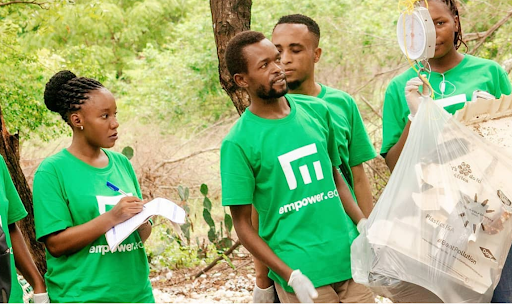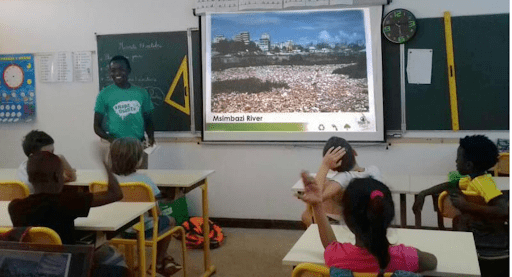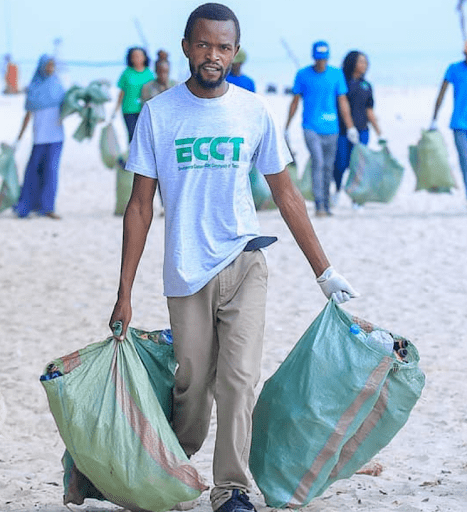By Carlos Mdemu
Social Media, Writing, and Online Outreach Intern
Since 2011, I have been working in the field of environmental and solid waste management. At the beginning of my journey, I remember visiting one of the famous local markets in Dar es Salaam for a community cleanup. The local market, in terms of waste management and general cleanliness, was threatening and filthy – not only to people who visited the market but also to the community around the market. There was no waste collection, no sewage for liquid waste, yet people around the market didn’t seem to care (they had ‘trash blindness’). This situation amplified my energy and passion for the environment. I started looking for ways I can help my communities to find the solution to address the issue of waste pollution.
The issue of waste was not only a problem at the market where we organized the cleanup, but also a general reality of mismanaged solid waste in Tanzania, and this has a serious effect on our health, environment, and exacerbates climate change. In Tanzania, 37% of waste generated is estimated to be buried, 31% of waste is dumped, and another 23% of waste is being burnt. Only 5% of the waste is regularly collected, 3% is irregularly collected, and 1% is dumped by the road side. Mismanaged waste contributes to flooding as it ends up in the rivers and blocks storm drains.
After graduating with a degree in geography and environmental studies, I decided to get involved with various projects, from a mentoring program with John Hopkins to an internship with a local environmental organization called Nipe Fagio. I wanted to gain environmental knowledge while improving the quality of life of those around me.
In September 2015, I saw a family consisting of one parent, one boy, and one girl who were gathered after they lost their house due to severe flooding in that area. The image of this family stayed with me, and I soon learned that flooding in Dar es Salaam is common during the rainy season due to solid waste and industrial effluents finding their way into the river, therefore clogging the city’s drainage systems and polluting the water. A few years later, heavy rains and extensive flooding in the city led to at least 15 people killed and more than 2,000 families in the Msimbazi Basin displaced. Since that day, I’ve been thinking a lot about people’s right to have access to a clean, safe, and healthy environment, and how I can continue to be a voice advocating for these basic needs. I did not know of something called an “activist” at this time, but later I realized that I can be an environmental activist and help others voluntarily.

I began looking for opportunities to deepen my understanding of climate solutions. I soon became one of the coordinating leaders of the ‘Let’s Do It’ campaign in Tanzania, which gathered different sectors and regions together to work nationally and globally to address waste problems.
On World Cleanup Day that year, with mobilization of different organizations, we conducted 102 cleanups, engaged 26,419 people, and collected 18,547 bags — 466,378 kg — of trash in the country! Through cleanups, we focus on local waste management solutions and climate change adaptation measures to help provide environmental, social, and economic benefits across the country.
Now, I work for Environmental Conservation Community of Tanzania (ECCT), an organization that works to address plastic pollution and its threat to terrestrial and marine life. We believe improved waste collection and disposal will significantly decrease environmental and health risks.
In 2006, the Tanzania Ministry of Health and Social Welfare (MoHSW) reported that between 60 and 80 percent of hospital admissions were due to sanitation-related diseases. Dar es Salaam in 2012 was ranked as the twelfth dirtiest city in Africa as a result of plastic waste being dumped in open areas. Rivers and water bodies across the city show abnormally high nutrient concentrations, further degrading water and soil quality. This is why we are acting on-the-ground to reduce these problems and promote eco-restoration.

Implementing Solutions
To me, ecosystem restoration means valuing the social, economic, emotional, spiritual, and cultural values embedded in nature, and how those values impact us. I also believe that the ocean is an important part of eco-restoration. It drives climate and weather, supplies oxygen for all and protein for many. To me the ocean means life. It’s very unfortunate how the ocean is so threatened and continues to be under assault from all sides. We need immediate efforts to address this challenge, such as beach cleanups. If we stop plastic waste from reaching ocean environments, and advocate for sustainable fishing, we will make significant steps towards a healthier and sustainable ocean, and that will benefit every other ecosystem.
Advocating the banning of single use plastic
Tanzania is among the countries that are restricting and banning several forms of plastic products and educating people about the negative impacts of plastic on the environment. Our efforts to minimize unnecessary plastic waste has contributed to Tanzania being one of the countries dedicated to the complete banning of plastic bags. Reducing the usage of plastic bags and instead replacing them with paper and reusable bags is proving extremely successful, as countries have seen a reduction in plastic bag usage by more than 50%.
Educating local communities
We know that the youth, who will inherit this Earth, are the ones who need to be aware of the problems and solutions. With ECCT we began a Youth Ambassadors program which includes training on environmental conservation issues and waste management.
We also have a campaign for coastal tree planting that will engage local fisherfolk and other coastal communities in planting trees along the coastal area to protect them from erosion and increase habitat for marine animals. We plan to plant more than 20,000 trees of seedlings along Dar es Salaam’s coast this year.
Through these programs, we hope to engage participants about ecosystem restoration through hands-on projects. We want to inspire others and show them that anyone can be an activist.

I believe that inspiring behavioral changes is the solution to the world’s problems of waste management, plastic pollution, and the degradation of Earth’s ecosystems. Saving the polluted land and oceans is my duty and the duty of everyone who relies on it. Developing countries like Tanzania have to leap-frog to a low-carbon economy and this includes improved solid waste management. Now we are looking for financial support to sustain a just transition to a low-carbon economy. We believe through continuous financial support, our activities will bring more direct benefits to communities and scale up projects.
My story is just one of the many people who are dedicating their careers to nature’s climate solutions. By sharing my story, I hope to motivate others to get involved in the movement to restore the human connection to nature. We each have a role, and our job is to find how we can best help restore the planet and the well-being of our neighbors, both human and non-human.
This is the message I carry to the world.

